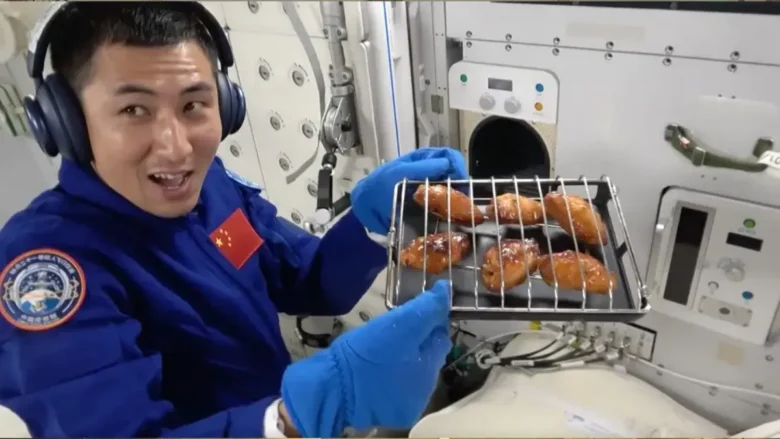Chinese astronauts have baked food in space for the first time, using a new oven inside the Tiangong station. The test happened this month after a cargo ship delivered the kitchen-sized unit. The crew cooked chicken wings to check if the equipment is safe and reliable in orbit, and mission managers said the trial worked as planned.
The oven marks a new stage in China’s effort to make long stays on Tiangong more comfortable. Astronauts often remain there for six months, eating packed or reheated meals. Engineers say hot, freshly cooked food can improve mood and help crews handle long work schedules. The station will rely on these upgrades as China prepares for future visits and longer missions.
Cooking in orbit is not as simple as it sounds. Without gravity, liquids float and heat moves slowly. Flames take round shapes instead of rising. To manage this, the oven seals the food inside a grill cage and rotates it on its own. That keeps juices from drifting into the cabin. It took nearly half an hour to cook the wings, which is slower than on Earth.
Safety is a priority. Fire spreads fast in oxygen-rich air, and a small spark could damage the station. The oven runs without open flames and acts like an air fryer. Sensors track the temperature and send alerts to the cabin system if something changes. Officials say all parts passed tests on the ground before launch.
Both the Shenzhou 20 and Shenzhou 21 crews joined the first bake. They shared food before the Shenzhou 20 team returned to Earth this week. The remaining astronauts will stay in orbit for several more months to run science tests and station repairs.
The oven weighs under 10 kilograms and fits against a wall panel in one of the labs. It heats up to 200 degrees Celsius while using low power from the station’s solar arrays. Engineers say it can handle hundreds of cooking cycles, enough to last for years. The design is permanent, unlike NASA’s one-time cookie experiment on the International Space Station in 2019.
China believes better food could help with longer missions, including planned lunar bases in the 2030s. Astronauts on those trips will face even more isolation, and the ability to cook could help them stay focused. For now, China says the Tiangong oven will keep running as part of daily life in orbit, adding new meals to a menu once limited to packets and reheated trays.

